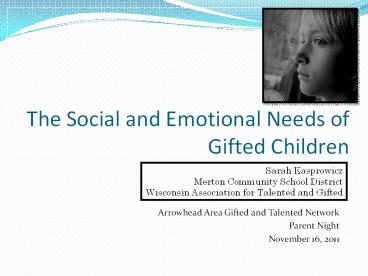The Social and Emotional Needs of Gifted Children
Title:
The Social and Emotional Needs of Gifted Children
Description:
... Assistance with transitions Suggest involvement in Tae Kwon Do Discussions with student about triggers Counseling about intensity Do not attempt to ... –
Number of Views:483
Avg rating:3.0/5.0
Title: The Social and Emotional Needs of Gifted Children
1
The Social and Emotional Needs of Gifted Children
Sarah Kasprowicz Merton Community School
District Wisconsin Association for Talented and
Gifted
- Arrowhead Area Gifted and Talented Network
- Parent Night
- November 16, 2011
2
- Sarah Kasprowicz
- Past President 2009-2011
- Member of WATG Board of Directors since 2000
http//www.watg.org/
3
What are the needs of gifted children?
- Healthy Relationship with themselves
- Healthy Relationship with others
- Healthy Relationship with their world
- Lisa Rivero, SENG
4
Common Roadblocks
- Asynchronous Development
- Intensity
- Perfectionism
- Misunderstandings
- 6 Profiles
5
Asynchronous Development
- Gifted children develop in multiple layers. They
can appear very mature in some areas and less
mature in others. - You could see all of the below items at the same
time - Highly advanced intellect
- Advanced sense of humor
- Acutely aware of fairness and injustice in the
world - Unable to tie their own shoes
- Need to sleep with the light on
- Unable to express their advanced thoughts in
writing
6
Implications
Frustration with themselves, others and their
world in general.
7
Age Peers vs. Intellectual Peers
- Not much in common with age peers
- Children may feel more like themselves with
intellectual peers, younger children, older
children or with adults - Friendship issue may occur
8
Intensity
Gifted children have a more intense experience
when making sense of themselves, others and their
world.
9
Intensity
- Dabrowskis Overexcitabilities and Theory of
Positive Disintegration - Psychomotor
- Sensual
- Intellectual
- Imaginational
- Emotional
10
Mellow Out
- Written by Michael Piechowski, Ph. D.
- Mellow out, they say, to which I can only
respond, If only I could. At birth I was
crucified with this mind that has caused me
considerable pain, and frustration with teachers,
coaches, peers, my family, but most of all with
myself. - Carol, cover illustrator
11
Accommodations for Intensity
- Help children with stress management
- Help with task analysis and time management
- Assistance with transitions
- Suggest involvement in Tae Kwon Do
- Discussions with student about triggers
- Counseling about intensity
- Do not attempt to fix the intensity.
- Children and parents need to accept intensity and
develop strategies to accommodate for themselves.
12
Perfectionism
- Parents might see
- Task avoidance
- Apathy
- Difficulty with task completion
- Anxiety
13
(Betts and Neihart, 1988)
6 Profiles
The Successful
The Drop Out
The Underground
The Autonomous Learner
The Double-Labeled
The Non-Conformist
14
http//animoto.com/play/7dUj9agrAmFfMAtDxtf8pg
15
You Tube Video
From Hoagies Gifted Education Page http//www.yout
ube.com/watch?vw-pQ2P_Vz3Qfeatureplayer_embedde
d! Susan Jackson from the Daimon Institute for
the Highly Gifted Giftedness is a continuum. The
children in the video express their experience.
Dont worry so much about identifying the level
of giftedness for your child. Please listen to
the message the children are trying to tell us.
Your child may or may not experience the same
issues.
16
(No Transcript)
17
Our Question For You
- What is it like to parent a gifted child?
- Do any of the issues presented tonight affect
your family? - How can we support each other in this journey?
18
(Supporting Emotional Needs of the Gifted)
SENG
- National Conference will be in Milwaukee
- http//www.sengifted.org/
- July 12-14, 2012
- Arrowhead Area SENG Model Parent Group
- March-May 2012
- Registration materials will be available through
your districts GT Department and/or website
19
Objectives of SENG Model Parent Groups
- Establish an environment in which facilitators
provide support and guidance, so parents of
talented children can interact and learn from
each other. - Increase parents awareness that talented
children and their families have special
emotional needs. - Develop parenting skills for nurturing the
emotional development of talented children. - Provide parents with materials to enhance
understanding of - Characteristics of high potential children.
- Programs and opportunities for talented children.
- Relevant books and professional organizations.
- Referrals for more in-depth professional
assistance. - Encourage parent involvement in and support of
appropriate educational opportunities. - (SENG website)
20
Thank You!
Any Questions?
kasprowiczs_at_merton.k12.wi.us































